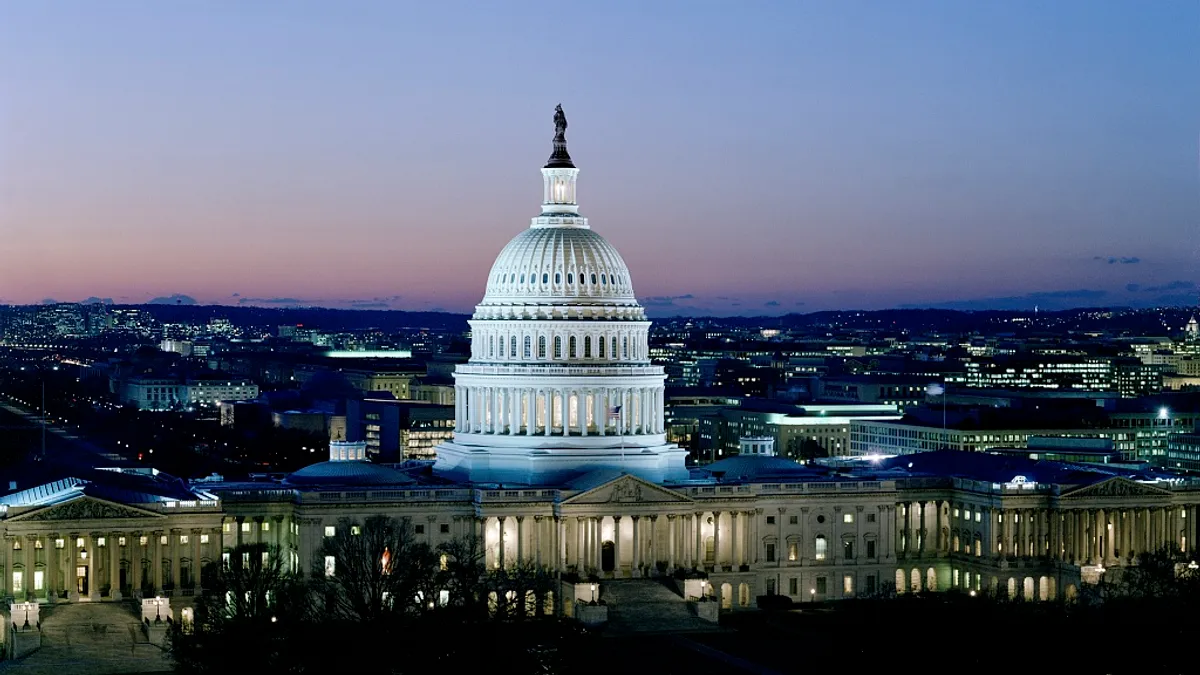Dive Brief:
- The U.S. Senate on Saturday morning voted 51-49 to pass a massive tax overhaul that could have significant impacts on a wide array of power sector technologies.
- Electric utilities largely support the package, but renewable energy groups oppose the inclusion of the Base Erosion Anti-Abuse Tax (BEAT) provision, which could prevent them from monetizing tax credits. Renewables and fossil fuel interests also object to the preservation of the alternative minimum tax, which they say could thwart research and development investment.
- The tax package now moves to a conference committee to be reconciled with a version that passed the House of Representatives last month. Clean energy interests will push for removal of the BEAT provision, while coal and nuclear lobbyists are reportedly planning a push to secure billions in tax credits for at-risk plants as an "interim solution" while the Federal Energy Regulatory Commission examines plant compensation.
Dive Insight:
After a week of intense negotiations, the Senate passed its overhaul of the tax code in the early hours of Saturday morning. Senate Republicans concluded adding amendments to the bill only hours before the vote, preserving the BEAT provision added only days before in the Finance Committee.
The BEAT provision targets "earnings stripping" — cross-border payments multi-national corporations use to reduce their U.S. tax bills. Renewable energy developers say the way it is calculated could make it difficult for large banks that partner with them to finance wind and solar projects.
As written, corporations would have to quantify 10% of their taxable income, including cross-border payments, and, in a second calculation, quantify their tax liability, excluding any tax credits. If the tax liability is less than the taxable income calculation, the government would collect the difference as a tax.
Under BEAT, wind and solar tax credits could reduce a corporation's tax liability, increasing their tax bills. That could affect "any large bank or insurance company in the tax equity market," Keith Martin, a partner with Norton Rose Fulbright, told Utility Dive last week.
BEAT was not the only unpleasant surprise for power sector interests. Over the weekend, energy interests spoke out against the inclusion of the corporate alternative minimum tax, which is designed to ensure companies don't use legal breaks to avoid all taxes.
Today, most businesses accept a higher, 35% corporate tax rate and use legal maneuvers to lower their effective tax rate below the 20% AMT. But the Senate bill would decrease the corporate tax rate to 20%, potentially driving companies to the AMT and forcing them to forego tax breaks they enjoyed before.
The biggest casualty could be tax breaks for R&D, the Wall Street Journal reports, angering energy interests. Bob Murray, CEO of coal miner Murray Energy, told the paper the bill could raise his company's taxes by $60 million.
“What the Senate did, in their befuddled mess, is drove me out of business and then bragged about the fact that they got some tax reform passed,” Murray said. “This is not job creation. This is not stimulating income. This is driving a whole sector of our community into nonexistence.”
As the bill proceeds to conference committee, renewable energy interests hope to persuade lawmakers to make wind and solar tax credits eligible for an R&D loophole in the BEAT provision and push them to reconsider the AMT. They will also seek to ensure the final bill does not include provisions from the House legislation that would cut renewable tax credits and eliminate a $7,500 federal credit for electric vehicles.
As the renewable energy sector plays defense, coal and nuclear lobbyists hope to do the opposite. According to Axios, their lobbyists are preparing a push to secure short-term tax credits to support aging power plants that could go offline due to competition from cheap gas and renewables.
For coal, the plan would reportedly allow plant owners to recover half of their operations and maintenance expenses up to a value of $26/kWh of generation capacity. That would cost between $6 billion and $6.5 billion for the 10-year plan.
For nuclear, lobbyists envision a 30% investment tax credit for capital spending at existing nuclear units. That would reportedly last for four years and cost between $1 billion and $1.2 billion.
Coal and nuclear lobbyists told Axios the tax plans are intended to provide short-term lifelines for at-risk plants while FERC undertakes a longer-term investigation of plant compensation in wholesale power markets. That's the same intent that acting FERC Chairman Neil Chatterjee expressed last month when he unveiled an interim plan to save coal and nuclear plants in an interview with Utility Dive.
Like Chatterjee, a spokesperson from AEP, a coal-bound midwestern utility, used the word "interim" to describe the coal lobby's tax proposal. But the tax provision targets a larger group of generators than what FERC is considering, which could be limited only to merchant plants in regions with capacity markets.
News of the legislative push could indicate that the coal and nuclear lobbies are less than confident that FERC will extend short-term support to their generators when the regulators face their deadline for action on Dec. 11. Regardless of motive, the generation tax breaks — particularly the more expensive coal bailout — face an uphill battle for final inclusion in the tax bill.
Regardless of BEAT, AMT and the baseload bailouts, electric utilities expect to benefit from the GOP tax reform. Lower corporate tax rates, they argue, could free up capital to invest in infrastructure upgrades, though critics worry utilities and other companies will simply return the difference to shareholders. As a former NARUC director noted on Twitter, ensuring utilities use their newfound wealth wisely will fall largely to state regulators.
Utility rates are set to cover the utility’s costs. One cost is taxes. If their taxes go down they can either lower rates, or incur more costs like infrastructure spending. Or, option 3, pocket the windfall. cc: Public Utility Commissions.
— Miles Keogh (@kidcongo) December 4, 2017













